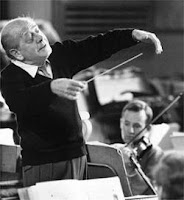 |
| The greatest? |
Performances range from the ridiculous: http://www.youtube.com/watch?v=2DwZ-GMHyho (Aretha Franklin at the 1998 Grammies)
To a number of them, sublime in their own way: http://www.youtube.com/watch?v=Eg-59NoES2o (Franco Corelli); http://www.youtube.com/watch?v=CrJC7l5Pn-k (Mario del Monaco); http://www.youtube.com/watch?v=CrJC7l5Pn-k (another Mario, this one the then-27-year-old Lanza).
But it took a visit to a web site touting a review of some 130 performances to find what is truly the best, in terms of sound, control and just plain overall chills and thrills. When compared to this singer, Pavarotti himself said, "I am only mortal," http://www.youtube.com/watch?v=xT09SI0LAjg (the amazing Jussi Bjorling, clocking in at nearly a minute longer than anyone else and yet his voice just simply shines.)
* * * * * * * * * *
This past week I somehow entered into a cyberspace discussion with musicologist and Iowa Public Radio host Barney Sherman about the amazing influx of great Hungarian conductors around the mid point of the 20th century (the thread actually began with kudos to another radio announcer's correct pronunciation of conductor Antal Dorati's last name: the emphasis is on the first syllable; otherwise it sounds Italian.) But consider this list: Eugene Ormandy, George Szell, Sir George Solti, the aforementioned Mr. Dorati, Christoph von Dohnányi, István Kertész, Adam and Ivan Fischer, Rafael Kubelík, Fritz Reiner, Hans Swarowsky. And this does not include Artur Nikisch and others of an earlier era.
Barney and I were just astounded at the number of great conductors from this seemingly small country. What was the impetus? What was the connection? The Liszt Academy? Thanks to a Hungarian friend, Laszlo Marosi, now of the University of Central Florida, I was able to uncover the mystery.
A couple of the conductors get a pass: while born in Budapest, Szell (originally György Széll) grew up in Vienna and von Dohnányi (interestingly enough, Szell's successor in Cleveland) was German-born and bred.
But here's the scoop on the rest:
Ormandy was born Jenő Blau in Budapest and trained as a violinist at the Royal National Hungarian Academy of Music (now the Lizst Academy). He came to America in 1921 and, through a fellow countryman, Erno Rupee, became a violist and eventual concertmaster of the orchestra of New York's Capital Theater, performing accompaniments for silent movies. He caught the attention of Arthur Judson, one of the most powerful men in the music business for much of the 20th century, and the rest is history. He held exactly two conducting positions for the rest of his life: The Minneapolis Symphony (now the Minnesota Orchestra) and his unprecedented 44-year tenure with the Philadelphia Orchestra.
 |
| Did he ever smile? |
 |
| He could smile (thankfully) |
Kertész, born later than many of the others (1929) did not begin his musical studies at the Liszt Academy until after the war. Early influences included Bruno Walter and Otto Klemperer, then Director of the Budapest Opera, which Kertész himself would lead from 1955-1957. The quashed Hungarian Revolution of 1957 sent him and his young family into exile in Germany, where he held many positions as a symphonic and operatic conductor. The players of the Cleveland Orchestra voted 96-2 to install Kertész as the successor to Szell but were overruled by that organization's Board of Directors. He drowned off the coast of Israel in 1973. Still, his discography is, to say the least, daunting.
 |
| A very young Kubelik |
 |
| Even younger Adam and Ivan |
Ivan Fischer, Adam's younger brother, began his studies in Budapest but later moved on to Vienna where he also entered the sphere of Swarowsky as well as Nikolaus Harnoncourt. While he has conducted worldwide, he is best known for his work founding the Budapest Festival Orchestra, which began as a part-time venture in 1983 (the ensemble became a permanent fixture in 1992).
But what is the underlying factor in the rise of so many significant conductors from what might appear at first glance to be an insignificant country? Certainly the U.S. cannot boast a list of musical luminaries to equal this? (Of course, much of this is due to our country's refusal to hire its own, but that has been the subject of previous posts.) No, many of these great Hungarian conductors fled their homeland because of their religion: the majority of them were/are Jewish and, of course, could not practice their art and craft during Hitler's annexation of their homeland. The only choice was to flee and they joined the many important physicists to run from the madman's clutches. The Fuhrer's decisions brought the makers of the atomic bomb to our shores, but also gave us a lasting cultural legacy. Tiny Hungary is truly a land of inspiring conductors.



No comments:
Post a Comment